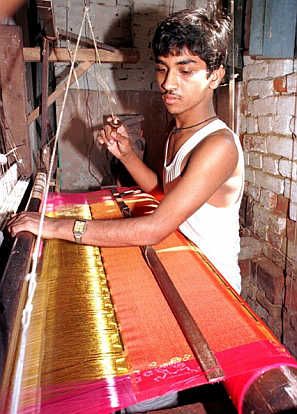Nirmala, 48, provides for her family by weaving a few silk sarees monthly. But she found it difficult to scout for buyers. That was before a cooperative society in a neighbouring village agreed to buy four sarees from her every month, at a fixed rate.
 However, the cooperative doesn’t buy more than the decided quota, leaving Nirmala to look for buyers for additional produce.
However, the cooperative doesn’t buy more than the decided quota, leaving Nirmala to look for buyers for additional produce.
“Most members of cooperatives have the ability and the will to produce more but don’t do so because their reach is limited and producers cannot ramp up when they want, unless required,” says Siva Devireddy, founder of GoCoop.com, an online marketplace for cooperatives to reach out to customers and businesses.
He adds cooperatives have “not received the importance they should have been given”.
The delinquency rate among self-help groups, even during downturns, is only one per cent, showing the reliability of this model, he says. “So, here are a set of people, often uneducated, not only doing business but also making money out of it. With the proceeds, they not only run their livelihoods but also return money to banks. Of every 100, 99 repay loans on time.”
For cooperatives, the marketing channel is filled with middlemen, often leading to lower realisation. “We realised there are several traders, suppliers and other middlemen between the producer and the buyer,” says Devireddy.
He further says, “The fundamental challenge for rural producers is marketing. Because of the intermediaries, they are far from consumers.”
As a result, many of these entities are struggling, charging nominal prices and recording long payment cycles, sometimes about six months.
“Therefore, we wanted to start a marketplace that would enable these producers to directly reach consumers. But it was necessary to be only an enabler, not an intermediary,” Devireddy adds.
Devireddy, the former director of innovation for Accenture in India, says he realised the cooperative model, though economically resilient and stable, lacked competitiveness. “We felt technology was vital to coordinate with such a large number of people.”
Devireddy’s team of 20 approaches cooperatives and convinces these to list products online. It handholds these from the point of resolving a query online to the point of purchases and packaging products.
“It is not difficult because we have seen after a little handholding, cooperatives are able to manage all orders on their own,” Devireddy says.
GoCoop.com is involved with about 2,500 cooperatives, with a membership of about a million. About a fourth of its customers are based abroad.
“In 2011, we had built a prototype. I had invested in it. We had a clear approach and a strategy to deal with the challenges. Whatever was conceptualised until then still holds,” says Devireddy.
In October 2011, Jaganmohan Reddy, Devireddy’s friend, joined him. Full-time operations were started in 2012, with six employees and a limited release of the online platform.
“We started with a directory, a repository of all profiles. The second part is listing all their products online. For organisations interested in marketing, we help these identify two-five products they want to promote and organise merchandising of those products online,” Devireddy says.
Next is a payment gateway to enable customers to make instant purchases.
Craftsvilla.com, the only other online marketplace with a similar model, connects local artisans and designers with global customers. The company is funded by US-based Nexus Venture Partners and Lightspeed Venture Partners.
GoCoop.com earns revenue by enrolling cooperatives as members. Though the directory service is free, cooperatives are charged for listing their products online. Each product is listed at Rs 50 a month and every cooperative has to list at least 10 products.
At an enrolment cost of at least Rs 6,000 a year, the business costs of cooperatives are about a third compared to the costs when intermediaries are involved.
“At a macrolevel, it will work only when you have scale…We have set a minimum order quantity to cover fixed expenses,” Devireddy says. “For listing, we charge Rs 6,000 but our direct cost for the service is Rs 3,000-4,000…Considering there are about 600,000 cooperatives in India, even if we manage to list one per cent online, we will get at least Rs 36 crore (Rs 0.36 billion).”
He plans to boost subscriptions by providing free tablets to producers opting for three-year subscriptions. “That way, our revenue is secured for long and producers have the ease of operations and realise more value from the listing,” he says.
Ask Devireddy what attracted him to this business and he is quick to reply his mission is to build a start-up that touches millions of lives.
Some experts, however, doubt GoCoop.com’s ability to gain scale. “Dealing with rural cooperatives is not easy.
Often, there is no structure or a clear decision maker to convince,” says an expert involved with cooperatives for about 15 years. “The challenge is more about changing mindsets than merely getting them to sign up.”
Devireddy, however, is optimistic. “Farmers do not have the means to make business profitable. The only way we can make India more equitable is through community-based models and this will only be encouraged more and more.
The challenge is these cooperatives have to give us new products every month. We have to work with them to add more products and new designs to the website; else, customers will not return.”
FACT BOX
*Area of business: Cooperatives
*Revenue: About Rs 1 cr in 2013-14
*Target: Listing 1,000 coops by 2019 (estimated at Rs 50 cr)
*Locations: Bangalore
*Funding: Series A — undisclosed
*Investors: Indian Angels Network, Unitus Seed Fund
*Revenue strategy: Enrolment of cooperatives into the website
*Challenges: Getting rural cooperatives to come online; keeping them motivated to produce more and produce varieties










